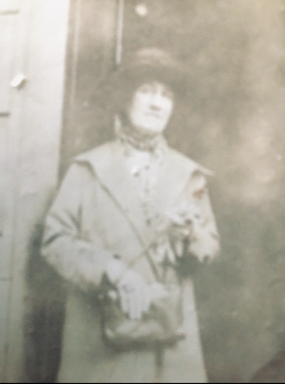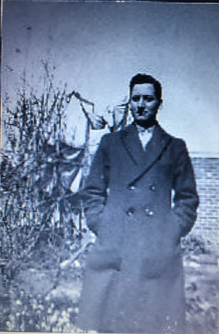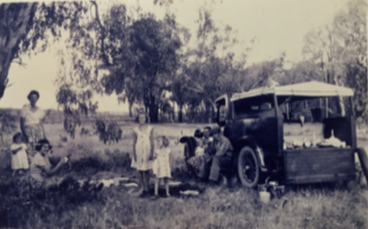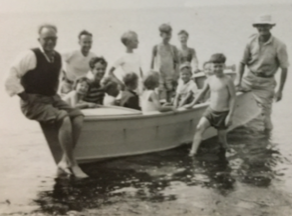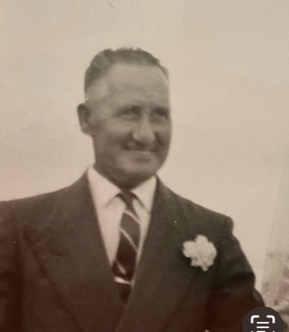Richard Arthur Webb
Ship name / Flight number: SS Esperance Bay
Arrival Date: 5/07/1926
Neville Webb remembers his father’s experiences with BBM.
My father, Richard, was born in Hove, East Sussex, on 12 July 1908. He had a younger sister, Eleanor. His mother, Euphemia is listed as his ‘next of kin’ on his arrival card.
Euphemia Webb, c.1920
Dad was one of the first ‘little brothers’ to come to Australia in 1926 when he was 17 years old. When the SS Esperance Bay sailed into Sydney he was met by a Big Brother, who was also the Minister for Police in NSW, and shown the sites of Sydney. The following day, he boarded the mail train to Wagga Wagga to start a new life as a farm hand.
Richard Webb soon after arriving in Australia in 1926.
My Mackay, another Big Brother who owned a menswear shop, met him at the Wagga Wagga train station and introduced him to Richard Roberts, whom dad would be working with. Because they shared the same first name, my dad started using his second name, Arthur, to avoid confusion.
Dad worked on the Roberts family’s wheat and sheep farm for a couple of years earning £1/week and his board. To earn some extra money, he did casual maintenance work for the Smith brothers who owned Kyeamba station and Kyeamba South – two very big sheep stations.
After two years, he asked Mr Roberts if he could invest some money of his own and grow some crops. Mr Roberts agreed to the share cropping arrangement. Neither of them anticipated the terrible drought that came in 1929-1933. All the crops died, there was no grass or food for the sheep, and the Roberts family eventually sold all the stock and walked off their farm in despair. My dad stayed with the family and moved into town with them.
Even though the drought ruined the farm and his first investment, he didn’t give up. In 1931, dad decided to go to Young to pick cherries in the summer. Next came a job on the ‘rabbit run’ – collecting rabbits from the professional trappers. The licensed trappers would catch about 200 rabbits a night and dad would collect them and take them to the rabbit inspectors who would check that they were clean before they went to the butchers. There was not much mutton around, due to the drought, so rabbits were an important source of meat. After a couple of months, he was promoted to the role of rabbit inspector.
Dad met his future wife through rabbits. Her parents were licensed ‘rabbitos’ and dad met Edna when he went to collect her father’s rabbits. He helped his future father-in-law to get his old car working, which also helped with getting permission to marry his daughter! Dad was ten years older than mum, and they got married when Edna was 19 years old. Mum grew up in a stone cottage with just one room, which was only 4-5 miles away from the farm that Dad worked on for Richard Roberts, although they didn’t know each other at this time.
Richard Webb and Edna (nee Heazlewood) at their wedding, 1937.
In 1941, dad got a job with Calvary Hospital in Wagga Wagga as a steam engineer. The whole hospital ran on steam – it was used to run the kitchens, the laundry, the heating and to sterilise medical equipment. The nuns grew vegetables and kept ducks, geese and chickens. The hospital was self-sufficient, except for meat. Dad was good at fixing things and soon became the head steam engineer. He stayed with the hospital for 30 years.
Dad kept in touch with a mate by the name of Jack Paslow whom he worked with when he was a rabbit inspector and Jack had a car that was burnt out in the back. When fuel was in short supply during World War II, some drivers used pig manure instead of petrol due to its high methane content. However, this could cause the back of the car to blow up. Dad turned the rear of Jack’s sedan into a ute. Jack was so grateful that he offered to loan him the ute to take his family on holidays. When dad’s colleagues at the hospital heard that he couldn’t afford the fuel to take up this offer, they had a whip around and gave him fuel cards so he could afford to go away.
We loved our holiday in the ute so much that dad gave up smoking so he could use the money to buy a wreck and some spare parts and turn it into a family vehicle. After this, we had family holidays every year.
Our first family car was built by my dad using spare parts from a burnt-out sedan and a canopy that he added.
My dad was very ‘handy’ and seemed to me, as a young boy, to have the ability to do anything. He really amazed me. It showed us that we could do things for ourselves. Dad needed a new challenge so he built a small boat and launched it at Port Arlington in Port Phillip Bay. I helped him to bend the timbers by steam and held his tools.
Testing out dad’s boat, 1952. Dad is at the stern wearing a hat and I am the tallest boy wearing overalls.
In the early 1940s, mum and dad bought two acres on Mitchelmore Road, Wagga Wagga, and sub-divided it into eight, quarter-acre blocks. My parents had a house built on one block, planted a stone fruit orchard along with figs and quinces on another block and sold the other land. Mum would bottle and preserve the fruits and make jam. We had a house cow and would make our own butter and cream, and kept chooks for eggs.
My family all dressed up to go to a wedding. My older sister is on the left, then my two parents and myself. In the front row are my younger brothers Robert (left), Kevin and my sister Beverley.
When Dad & Mum were married they started hatching chickens and continued in Mitchelmore road. Dad bought an incubator to hatch chicken eggs and sell the day-old chicks. He was resourceful and made a set of egg scales so that he could have every egg at the right weight before putting them into the incubator. People would pre-order their chickens and pay for the freight. Mum learnt how to ‘sex’ the chickens so that she could sell pullets and not roosters. Dad built a shed on the property to store the incubator and chicken feed.
After about ten years in town, my parents sold their two acres in town and bought a 70 acre property on Gregadoo Road, about 10km out of Wagga Wagga, in 1956. It was a dairy farm with pigs and poultry. I was 12 years old by then and dad told me to ride my pushbike out to the farm and work for two weeks with Mr Wise to learn how to run the dairy farm. I felt quite responsible.
We did very well on the farm. We had four breeding sows so we always had piglets to sell. We used to dress the pigs ourselves and then take the carcass out to the bacon factory for smoking. We also kept chooks to sell eggs, but it wasn’t profitable. Dad bought a hay press and started where he left off on the Roberts family farm. He planted wheat to feed to the pigs and oats to make hay. Dad built our farmhouse with the help of his sons and Audrey’s husband – he even built his own cement mixer to make the mortar for the bricks! However, his early experiences in the drought meant he continued to work at the hospital in case the rains failed and the farm wasn’t prosperous enough to feed five children.
I was one of three sons and I have two sisters. We all worked on the farm but eventually drifted into town for work.
My parents sold the farm around 1968. Dad originally wanted to sub-divide the land, but due to the lack of road and sewerage infrastructure, he was convinced by a real estate agent to sell it as one property. After doing this, the real estate agent worked with a developer to do the sub-division that he had talked dad out of. I seldom saw my father angry, but I did on this occasion.
My dad dressed up to go to my sister Audrey’s wedding in 1960.
When he retired from the hospital at age 60, dad and mum bought a two bedroom cottage at Batehaven on Bateman’s Bay which over-looked the ocean. They also bought a caravan for when extra people came to stay. My wife and I would go there with our children during the school holidays.
Tragically, dad only enjoyed four years of his retirement as he had a heart attack in 1972 when he was pulling his tinny onto the beach after a fishing trip. He died instantly. He was only 64 years old.
Mum stayed at Batehaven for a while until her worsening arthritis made her decide to return to Wagga Wagga. She died 25 years after dad at the age of 79.
In 1973, Robert, my closest brother in age, was riding his motorbike home from work when he was hit by a car and died instantly. He left behind a wife and three daughters. To lose two members of my immediate family in as many years was devastating.
My dad had a happy life. I’m very proud of him. I know he was pleased to have the support of the BBM to come to Australia and never regrated it.



